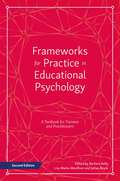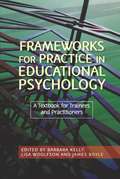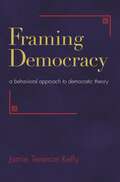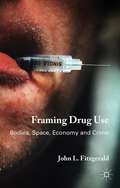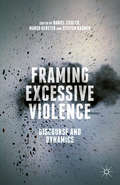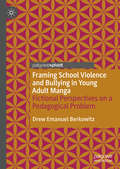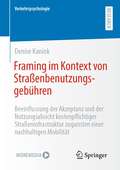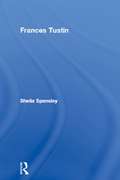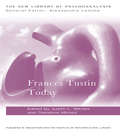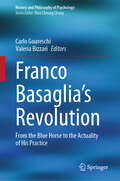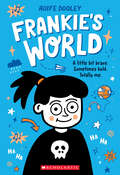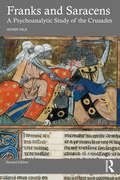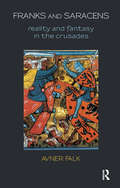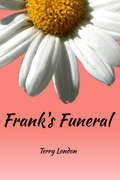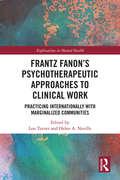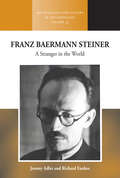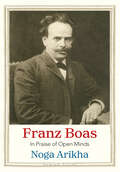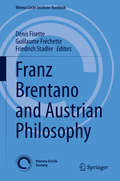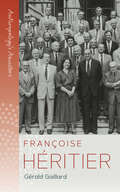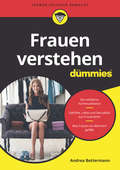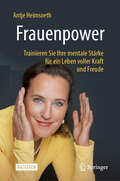- Table View
- List View
Frameworks for Practice in Educational Psychology, Second Edition: A Textbook for Trainees and Practitioners
by Susan Dean Stephen Joseph Barbara Kelly Tommy Mackay Sandra Dunsmuir Geoff Lindsay Jane Leadbetter James Boyle Ioan Rees Gillian Rhydderch Patsy Wagner Fraser Lauchlan John Gameson Norah Frederickson Andrew Richards Bob Burden Jeremy Monsen Lisa Marks Woolfson Michael E. HarkerNow in its second edition, this comprehensive textbook presents a rich overview of approaches to educational psychology, through an in-depth exploration of both existing and emerging practice frameworks. Covering established techniques such as the Monsen et al. Problem-Solving Framework and the Constructionist Model of Informed and Reasoned Action, the book sets out new material on innovative methods and approaches such as Implementation Science and a Problem-Solving - Solution Focussed integrated model for service delivery. Accessible summaries are accompanied by perceptive assessments of how these frameworks meet modern needs for accountable, transparent and effective practice. Providing a definitive, up-to-date view of educational psychology, the book explains the complex, integrated methodology necessary to succeed in the field today. Thoughtful and clear, this textbook will be an invaluable resource for all practicing educational psychologists, students, trainers and educators.
Frameworks for Practice in Educational Psychology: A Textbook for Trainees and Practitioners
by Stephen Joseph Barbara Kelly Tommy Mackay Geoff Lindsay Jane Leadbetter James Boyle Ioan Rees Lisa Woolfson Andrew Richard Gillian Rhydderch Patsy Wagner Jey Monsen Fraser Lauchlan John Gameson Norah Frederickson Robert BurdenThis textbook assesses existing and emerging practice frameworks in educational psychology and their relation to theory. Covering current frameworks, such as the Monsen et al. Problem-Solving Framework, the Integrated Problem Solving Framework for Practitioners and the Constructionist Model, as well as emerging approaches, such as Systemic Solution Focussed Models and Positive Psychology Frameworks, contributors explore how they support educational psychology. The editors consider how existing and emerging frameworks help address current demands for professional accountability, transparency and effectiveness. They conclude with an exploration of the complex methodology and highly integrated approach required by contemporary educational psychologists. This textbook will be an invaluable resource for all practising educational psychologists, students, trainers, and educators.
Framing Democracy: A Behavioral Approach to Democratic Theory
by Jamie Terence KellyThe past thirty years have seen a surge of empirical research into political decision making and the influence of framing effects--the phenomenon that occurs when different but equivalent presentations of a decision problem elicit different judgments or preferences. During the same period, political philosophers have become increasingly interested in democratic theory, particularly in deliberative theories of democracy. Unfortunately, the empirical and philosophical studies of democracy have largely proceeded in isolation from each other. As a result, philosophical treatments of democracy have overlooked recent developments in psychology, while the empirical study of framing effects has ignored much contemporary work in political philosophy. In Framing Democracy, Jamie Terence Kelly bridges this divide by explaining the relevance of framing effects for normative theories of democracy. Employing a behavioral approach, Kelly argues for rejecting the rational actor model of decision making and replacing it with an understanding of choice imported from psychology and social science. After surveying the wide array of theories that go under the name of democratic theory, he argues that a behavioral approach enables a focus on three important concerns: moral reasons for endorsing democracy, feasibility considerations governing particular theories, and implications for institutional design. Finally, Kelly assesses a number of methods for addressing framing effects, including proposals to increase the amount of political speech, mechanisms designed to insulate democratic outcomes from flawed decision making, and programs of public education. The first book to develop a behavioral theory of democracy, Framing Democracy has important insights for democratic theory, the social scientific understanding of political decision making, economics, and legal theory.
Framing Drug Use
by John L. FitzgeraldFraming Drug Use examines the forces that shape the way we use drugs. The book analyses space, streetscapes, languages, signs, photographs, stories, routines, social organisations and the frameworks of everyday life, which contribute to drug-related harm. This variously implicates the forces of economics, emotion, physical pleasure and culture. John Fitzgerald importantly proposes a new set of tools and a new framework for analyzing drug problems. The new framework suggests that care, compassion and responsibility might come to replace blame and punishment as central terms that define how we approach drug control.
Framing Excessive Violence: Discourse and Dynamics
by Daniel Ziegler Marco Gerster Steffen Kr�merThis book explores the dynamics of excessive violence, using a broad range of interdisciplinary case studies. It highlights that excessive violence depends on various contingencies and is not always the outcome of rational decision making. The contributors also analyse the discursive framing of acts of excessive violence.
Framing School Violence and Bullying in Young Adult Manga: Fictional Perspectives on a Pedagogical Problem
by Drew Emanuel BerkowitzThis book closely examines the ways in which many popular, internationally-published Japanese young adult manga graphic novel titles frame instances of K-12 school-situated violence and bullying. Manga is a Japanese literary medium that has grown worldwide as an increasingly visible fixture of young adults’ recreational reading habits. The author uncovers the medium’s most prevalent patterns of defining, depicting, and discussing school-situated violence and bullying. Through the lens of socio-cultural media frame analysis, he explores what these patterns might indicate about young adults' preexisting views and beliefs about occurrences of violence and bullying within their own school environments. This in-depth investigation of manga literature provides important information pertaining to the pedagogies and practices of K-12 teachers and school administrators, as well as detailed advice for parents of young adult manga fans.
Framing im Kontext von Straßenbenutzungsgebühren: Beeinflussung der Akzeptanz und der Nutzungsabsicht kostenpflichtiger Straßeninfrastruktur zugunsten einer nachhaltigen Mobilität (Verkehrspsychologie)
by Denise KaniokStraßenbenutzungsgebühren haben sich als technisch realisierbarer und effektiver Lösungsansatz für Verkehrsprobleme herausgestellt. Eine wichtige Voraussetzung für eine erfolgreiche Einführung dieser preispolitischen Maßnahme ist deren ausreichend hohe Akzeptanz. Denise Kaniok prüft mittels wissenschaftlicher Untersuchungen, inwieweit eine unterschiedliche Darstellungsweise von Straßenbenutzungsgebühren beeinflussende Wirkung auf die Bewertung und die Nutzungsabsicht kostenpflichtiger Straßeninfrastruktur hat. Denn bei der Betrachtung menschlicher Entscheidungsmuster wird deutlich, dass allein durch die unterschiedliche Formulierung eines Sachverhaltes, dem sogenannten Framing, divergierende Entscheidungen hervorgerufen werden können. Die Ergebnisse deuten auf einen Einfluss der Informationsdarstellung auf menschliche Entscheidungen hin. Insbesondere bezüglich der Faktoren Zeit und Kosten zeigt sich eine hohe Sensitivität. Drohende Zeitverluste führen zu stärkeren Verhaltenseffekten als in Aussicht gestellte identische Zeitgewinne. Es wird eine stärkere Fokussierung auf den Deutungsrahmen empfohlen, sodass mittels gezielt eingesetzter Informationsdarstellung Verhaltens- und Einstellungsmuster im Sinne von nachhaltiger Mobilität hervorgerufen werden.
Frances Tustin (Makers of Modern Psychotherapy)
by Sheila SpensleyFrances Tustin describes the life and clarifies the work of an outstanding clinician whose understanding of autistic and psychotic children has brilliantly illuminated the relationship between autism and psychosis for others in the field. Sheila Spensley defines Tustin's position in traditional and contemporary psychoanalytic theory and explains how it is related to work in infant psychiatry and developmental psychology. She makes Tustin's original concepts accessible to the non-specialist reader and shows how relevant they are to work in other areas such as learning disability and work with adult patients.
Frances Tustin Today (New Library of Psychoanalysis)
by Judith L. Mitrani and Theodore MitraniFrances Tustin Today explores some of the ways and means by which Tustin’s work has enabled psychoanalytic clinicians to enter into the elemental domain of sensation: what Bion called the ‘proto-mental’ area of the psyche-soma. Through detailed clinical contributions of several of her exponents worldwide, this book demonstrates how her ideas -- rooted in decades of work with children on the autistic spectrum -- have influenced and are being expanded, extended and applied to the treatment of ordinary patients from early childhood through adulthood. The contributors to this volume represent a selection of the contemporary thinking that organically grew out of Tustin’s discoveries, and show that Tustin's model has added new dimensions to the fields of infant observation, family therapy and neuro-psychology. Each chapter is augmented by demonstrable clinical experience. Frances Tustin Today is a valuable resource for psychoanalysts, psychotherapists, educators and parents who are interested in learning more about this uniquely independent clinical observer's findings and their impact upon the treatment of autistic states in children, adolescents and adults by contemporary workers in the field of mental health. Judith L. Mitrani, and Theodore Mitrani, are Fellows of The International Psycho-Analytical Association, Training and Supervising Psychoanalysts at The Psychoanalytic Center of California in Los Angeles. They are founding members of the Board of Trustees of The Frances Tustin Memorial Trust, and authors, editors, translators and teachers in the private practice of psychoanalysis and psychoanalytic therapy with Adults and Children in Los Angeles, California.
Franchised States and the Bureaucracy of Peace (Rethinking Peace and Conflict Studies)
by Niels Nagelhus SchiaThis book examines a new type of state formation evoked by the rise of transnational rule, what Schia calls franchised states. Drawing on anthropological studying-through fieldwork within the UN organization, he demonstrates how peacebuilding activities turned Liberia into an object of governing, whereby the UN, in seeking to build the state, also became the state. The sovereign state of Liberia here emerges as a franchise rather than a self-contained entity. Two implications follow: First, that international peacebuilding turns post-conflict countries into clients of the international community. Second, that "sovereignty" is no longer exclusively associated with the state: it is organized in and through specific practices of governing where a state actor is only one among a range of actors. With these findings, the book moves beyond previous work on peacebuilding by focusing on the unbundling of sovereignty. It contributes to the literature on the changing forms of sovereignty by showing the specific ways in which sovereignty is organized, packaged and enacted, often by actors working under international auspices. This book will be of interest to practitioners and students interested in international organizations, international relations, the study of international practices, UN, and peacebuilding.
Franco Basaglia's Revolution: From the Blue Horse to the Actuality of His Practice (History and Philosophy of Psychology)
by Carlo Guareschi Valeria BizzariThis book explores the importance of the work of Franco Basaglia, a pioneer in the democratic psychiatry movement. Using a multidisciplinary approach combining philosophy and psychology this volume seeks to illuminate the past and create a clearer picture of Basaglia's impact in conceptualizing modern psychiatric care. It reviews the contemporary status of care and offers new insights for a critical evaluation of care that takes the psychiatric revolution to a new level. Highlights Basaglia’s diagnostic and clinical practice Employs a multi-disciplinary approach Joins phenomenology and critical theory
Frankie's World: A Graphic Novel
by Aoife DooleyFrom acclaimed Autistic Irish comedian Aoife Dooley comes a fresh and funny debut middle-grade graphic novel about fitting in and standing out.Frankie is different from everyone in her class, and she can't figure out why. She has trouble concentrating, and her classmates tease her for not having a dad at home. To try to make sense of the world, Frankie doodles her daily adventures in a journal. One day, when Frankie sneaks into her mom's room and sees her biological father's name on her birth certificate, she decides to go on a mission to track him down. Could Frankie's father be the key to finding out why Frankie feels so adrift?A unique story told with a light touch and an abundance of warmth and wit, Frankie's World is laugh-out-loud funny and a love letter to daring to be different.
Franks and Saracens: A Psychoanalytic Study of the Crusades
by Avner FalkFranks and Saracens is the first and only book to examine the Crusades from the viewpoint of psychoanalysis, studying the hidden emotions and fantasies that drove the Crusaders and the Muslims to undertake their terrible wars.Using original documents as well as secondary sources, Avner Falk demonstrates that the deepest and most powerful motives for the Crusades were not only religious or territorial – or the quest for lands, wealth, or titles – but also unconscious emotions and fantasies about one's country, one's religion, one's enemies, God and the Devil, Us and Them. The book demonstrates the collective inability to mourn large-group losses, and the collective needs of large groups such as nations and religions to develop a clear identity, to have boundaries, and to have enemies and allies. Falk investigates the unconscious dynamics of the Crusades, both on the individual and on the collective level, to understand why the Crusading fantasies persisted for nearly two centuries, and why the “northern Crusades” went on until the early fifteenth century. This updated edition adds a new chapter on collective trauma both as cause and as consequence of the Crusades and has been fully revised to include literature on trauma and other psychological aspects of the Crusades.Franks and Saracens will be of great interest to historians, political scientists, medievalists, psychologists, psychiatrists, psychoanalysts, anthropologists, and sociologists interested in questions of conflict, fantasy, and identity, collective psychological processes, and to academics of the Crusades and military history.
Franks and Saracens: Reality and Fantasy in the Crusades
by Avner FalkThis is the first and only book to examine the Crusades from the added viewpoint of psychoanalysis, studying the hidden emotions and fantasies that drove the Crusaders and the Muslims to undertake their terrible wars. The reader will learn that the deepest and most powerful motives for the Crusades were not only religious or territorial - or the quest for lands, wealth or titles - but also unconscious emotions and fantasies about one's country, one's religion, one's enemies, God and the Devil, Us and Them. The book also demonstrates the collective inability to mourn large-group losses and the collective needs of large groups such as nations and religions to develop a clear identity, to have boundaries, and to have enemies and allies. Motives which the Crusaders and the Muslims were not aware of were among the most powerful in driving several centuries of terrible and seemingly endless warfare.
Frank’s Funeral
by Terry LondonFrank was an abusive and violent alcoholic. Terry was his eldest daughter. Frank's 'mistress' was a dark and foreboding force throughout Terry's life -- while Frank was alive and well after his death. Terry suffered many beatings as a child and as an adult. Frank was very cruel. He had a warped idea of love. Frank's final wishes in his Last Will and Testament were difficult to comprehend. Sadly, Terry had to fight against members of her own family in the Supreme Court. Terry's raw and incredibly honest story is heartbreaking. Her sense of humour doesn't mask the sadness, but makes some of the words easier to read. This is a true story of strength and courage.
Frantz Fanon’s Psychotherapeutic Approaches to Clinical Work: Practicing Internationally with Marginalized Communities (Explorations in Mental Health)
by Helen A. Neville Lou TurnerRecognizing Frantz Fanon’s remarkable legacy to applied mental health and therapeutic practices which decolonize, humanize, and empower marginalized populations, this text serves as a timely call for research, education, and clinical work to establish and further develop Fanonian approaches and practices. As the first collection to focus on contemporary clinical applications of Fanon’s research and practice, this volume adopts a transnational lens through which to capture the global reach of Fanon’s work. Contributors from Africa, Australia, Europe, and North America offer nuanced insight into historical and theoretical methods, clinical case studies, and community-based innovations to place Fanon’s research and practice in context. Organized into four key areas, including the Historical Significance of Fanon’s Clinical Work; Theory and Fanonian Praxis; Psychotherapeutic and Community Applications; and Action Research, each section of the book reflects an impressive diversity of practices around the world, and considers the role of political and socioeconomic context, structures of gender oppression, racial identities, and their intersection within those practices. A unique manifesto to the ground-breaking and immensely relevant work of Frantz Fanon, this book will be of great interest to graduate and post graduate students, researchers, academics and professionals in counselling psychology, mental health research, and psychotherapy.
Franz Baermann Steiner: A Stranger in the World (Methodology & History in Anthropology #42)
by Jeremy Adler Richard FardonFranz Baermann Steiner (1909-52) provided the vital link between the intellectual culture of central Europe and the Oxford Institute of Anthropology in its post-Second World War years. This book demonstrates his quiet influence within anthropology, which has extended from Mary Douglas to David Graeber, and how his remarkable poetry reflected profoundly on the slavery and murder of the Shoah, an event which he escaped from. Steiner’s concerns including inter-disciplinarity, genre, refugees and exile, colonialism and violence, and the sources of European anthropology speak to contemporary concerns more directly now than at any time since his early death.
Franz Boas: In Praise of Open Minds (Jewish Lives)
by Noga ArikhaA thought-provoking account of the life and work of Franz Boas and his influential role in shaping modern anthropology Franz Boas (1858–1942) is widely acknowledged for his pioneering work in the field of cultural anthropology. His rigorous studies of variations across societies were aimed at demonstrating that cultures and peoples were not shaped by biological predispositions. This book traces Boas&’s life and intellectual passions from his roots in Germany and his move to the United States in 1884, partly in response to growing antisemitism in Germany, to his work with First Nations communities and his influential role as a teacher, mentor, and engaged activist who inspired an entire generation. Drawing from Boas&’s numerous but rarely read writings, Noga Arikha brings to life the man and the ideas he developed about the complex interplay of mind and culture, biology and history, language and myth. She provides a comprehensive picture of the cultural contexts in which he worked, of his personal and professional relationships, and of his revolutionary approach to fieldwork. He was celebrated in his lifetime for the cultural relativism he developed and the arguments he marshaled against entrenched racialism. But his was a constant battle, and Arikha shows how urgently relevant his voice and legacy have become again today.
Franz Brentano and Austrian Philosophy (Vienna Circle Institute Yearbook #24)
by Friedrich Stadler Denis Fisette Guillaume FréchetteThe book discusses Franz Brentano’s impact on Austrian philosophy. It contains both a critical reassessment of Brentano’s place in the development of Austrian philosophy at the turn of the 20th century and a reevaluation of the impact and significance of his philosophy of mind or ‘descriptive psychology’ which was Brentano's most important contribution to contemporary philosophy and to the philosophy in Vienna. In addition, the relation between Brentano, phenomenology, and the Vienna Circle is investigated, together with a related documentation of Brentano's disciple Alfred Kastil (in German). The general part deals with the ongoing discussion of Carnap's "Aufbau" (Vienna Circle Lecture by Alan Chalmers) and the philosophy of mind, with a focus on physicalism as discussed by Carnap and Wittgenstein (Gergely Ambrus). As usual, two reviews of recent publications in the philosophy of mathematics (Paolo Mancosu) and research on Otto Neurath's lifework (Jordi Cat/Adam Tuboly) are included as related research contributions. This book is of interest to students, historians, and philosophers dealing with the history of Austrian and German philosophy in the 19th and 20th century.
Françoise Héritier (Anthropology's Ancestors #3)
by Gérald GaillardFollows the life of French anthropologist Françoise Héritier, who had a lasting impact on a generation of French anthropologists that continues to this day. A great intellectual figure, Françoise Héritier succeeded Claude Lévi-Strauss as the Chair of Anthropology at the Collège de France in 1982. She was an Africanist, author of magnificent works on the Samo population, the scientific progenitor of kinship studies, the creator of a theoretical base to feminist thought and an activist for many causes. “I read this intellectual biography of Françoise Héritier with great pleasure. Though highly regarded in France, she is not yet well known in English-language academic circles, but she certainly should be. This book will be a revelation to many anthropologists and feminist scholars.”—Adam Kuper, London School of Economics From the Forword by Michelle Perrot: I came to know her at the National Council for HIV, that she chaired from 1989 to 1994…. Her theoretical concerns were also crucial to the understanding of pandemics, but we did not then realise that HIV/AIDS was also a precursor and a warning of pandemics to come. She grasped the importance of conceptions of bodily ‘humours’—blood, semen, milk—that seemed to play a role in the horrific spread of an epidemic of which we knew nothing, except that it resulted in an appalling mortality rate, particularly among young men…. she was a remarkable chair, concerned to share her insights into the illness and to anchor—necessary—interventions within a framework that would be respectful of human rights.
Fratriarchy: The Sibling Trauma and the Law of the Mother
by Juliet MitchellIn Fratriarchy, Juliet Mitchell expands her ground-breaking theories on the sibling trauma and the Law of the Mother. Writing as a psychoanalytic practitioner, she shows what happens from the ground up when we use feminist questions to probe the psycho-social world and its lateral relations. In this pivotal text, Mitchell argues that the mother’s prohibition of her toddler attacking a new or expected sibling is a rite of passage from infancy to childhood: this is a foundational force structuring our later lateral relationships and social practices. Throughout the volume, Mitchell chooses the term 'Fratriarchy' to show that, as well as the up-down axis of fathers and sons, there is also the side-to-side interaction of sisters and brothers and their social heirs. Making use both critically and affirmatively of Freud, Klein, Winnicott, Bion, Pontalis and others, Fratriarchy indicates how the collective social world matches the individual family world examined by established psychoanalysis. Decades on from Mitchell’s work on psychoanalysis and feminism which argued that feminism needed psychoanalysis to understand the position of women, Fratriarchy now asks psychoanalysis to take on board the developing practices and theories of global feminism. This volume will be essential reading for analysts, psychotherapists, psychologists and anyone who wants to re-think the ubiquity of unconscious processes. It will also interest students and teachers of social theory, psychoanalysis, group analysis, gender studies and feminism.
Frauen verstehen für Dummies (Für Dummies)
by Andrea BettermannFür Sie sind Frauen einfach nur ein Rätsel und Sie suchen nach Erleuchtung? Oder sind Sie eine Frau und verstehen sich manchmal selbst nicht? In diesem Buch finden Sie umfassende Informationen zum Thema Frau:Andrea Bettermann spricht über Partnerschaft, Sexualität und Kommunikation und erklärt, warum Frauen manchmal für Männer unverständlich handeln und reagieren, welche besondere Bedeutung die beste Freundin hat, warum viele Frauen Shopping lieben und was Frauen an Männern mögen.
Frauen, die Sex verkaufen: Ein Überblick über die psychologische Forschung mit klinischen Implikationen
by Elizabeth Krumrei Mancuso Bennett E. PostlethwaiteAuf der Grundlage führender empirischer psychologischer Forschungsarbeiten aus der ganzen Welt bietet dieses Buch wertvolle Erkenntnisse über Frauen, die Sex verkaufen. Es fasst die umfangreiche wissenschaftliche Arbeit zum Thema Frauen, die Sex verkaufen, aus einer psychologischen Perspektive zusammen, um zu verstehen, warum Frauen sich dafür entscheiden. Im Gegenzug hebt das Buch eine Reihe wichtiger soziokultureller Kontexte rund um den Verkauf von Sex hervor, die große Stressquellen darstellen, und untersucht, wie Frauen mit diesen Umständen umgehen. Das Buch veranschaulicht den facettenreichen Charakter des Verkaufs von Sex und trägt zu Debatten über individuelle und gesellschaftliche Reaktionen auf dieses wichtige gesellschaftspolitische - und zugleich zutiefst persönliche - Thema bei. Das Buch enthält originelles Fallmaterial und zeigt künftige Forschungsrichtungen auf. Es ist eine informative und ansprechende Quelle für Akademiker, Forscher, Studenten und Fachleute auf der ganzen Welt.
Frauen-Selbsthilfegruppen im Kontext von Therapeutisierung: Eine rekonstruktive Analyse narrativer Identitäten (Frankfurter Beiträge zur Soziologie und Sozialpsychologie)
by Simone GullyPsychologisch-therapeutische Denkweisen und Praktiken sind gesellschaftlich weit verbreitet. Die Teilnahme an Selbsthilfegruppen wird in der sozial- und kulturwissenschaftlichen Forschung in diesem Kontext verortet und unter den Stichwörtern Therapeutisierung oder therapeutische Kultur verhandelt. Um die Perspektiven von Teilnehmenden an therapeutischen Praktiken zu verstehen und eigensinnige Verwendungsweisen und Bedeutungen therapeutischer Diskurse und Praktiken zu eruieren, wurde eine qualitativ-rekonstruktive Studie durchgeführt und narrative Identitäten von Teilnehmerinnen an Frauen-Selbsthilfegruppen des Bereichs psychische Gesundheit analysiert. In diesem Band werden vielfältige Wirkweisen von (Frauen-) Selbsthilfegruppen aufgezeigt und differenziert mit gesellschaftsdiagnostischen Perspektiven auf Therapeutisierung und Optimierung in Bezug gesetzt.
Frauenpower: Trainieren Sie Ihre mentale Stärke für ein Leben voller Kraft und Freude
by Antje HeimsoethSelbstvertrauen, Fokus sowie ein gutes Selbstmanagement sind Schlüsselfaktoren für den Erfolg – nicht nur im Business. Im Buch wird dargestellt, wie Frauen sich oft selbst ausbremsen, was die Auslöser dafür sind und wie Frauen sie beheben können. Sie finden Antworten auf: Wie kann man mentale Stärke trainieren, Unsicherheiten ablegen, sein eigenes Potenzial voll ausschöpfen und sich selbst verwirklichen? Anschaulich und unterhaltsam schildert die Autorin, was es bedeutet, eine mental starke Frau zu sein. Sie zeigt, wie sich mittels verschiedener mentaler Techniken Blockaden überwinden lassen, hochgesteckte Ziele voller Lebensfreude angegangen werden können und Erfüllung im Leben erreichbar wird. Das Buch enthält hilfreiche, alltagstaugliche Tipps und Übungen, spannende Geschichten sowie lehrreiche Erfahrungsberichte. In der 2. Auflage befasst sich die Autorin noch stärker mit den Aspekten Mut, mentale Gesundheit und Selbstliebe: Seien Sie mutig!
